Unable to work since COVID vaccination, Gatineau man pins hopes on compensation
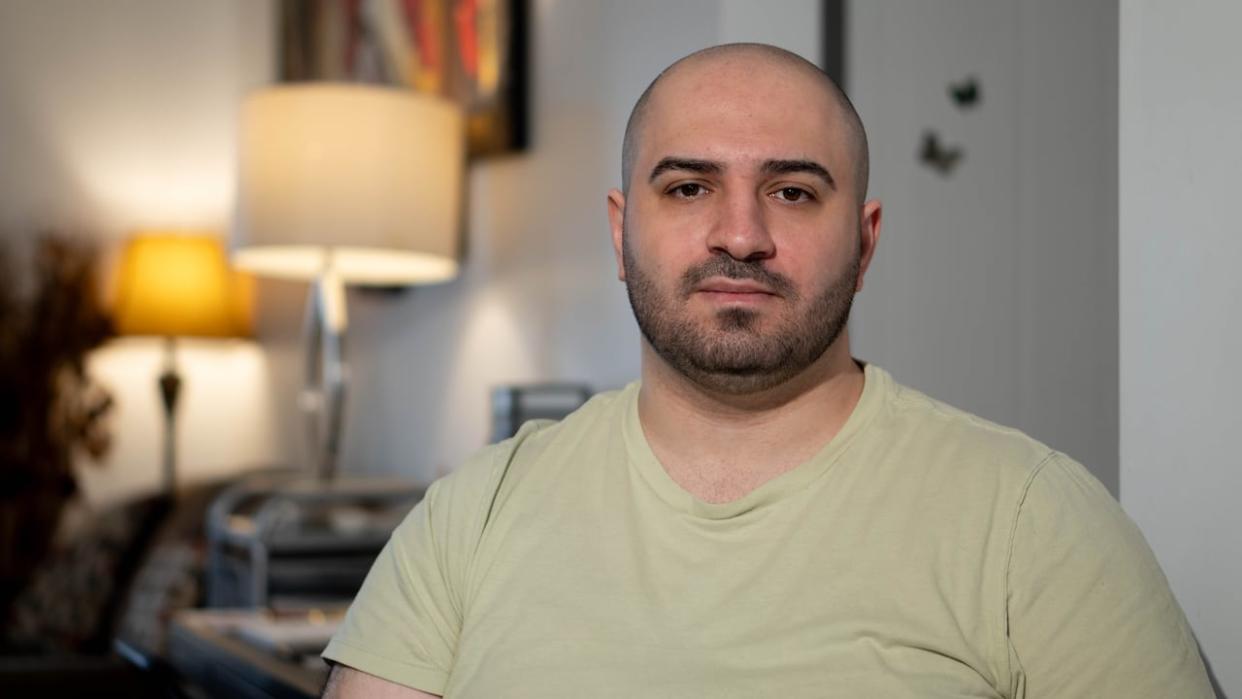
A Gatineau, Que., man who developed a debilitating skin ailment after receiving a COVID-19 vaccine nearly three years ago says he's still suffering despite seeking medical help both in Canada and abroad.
"There is no improvement at all," said Tisir Otahbachi. "I feel itchy and burning, all [over] my body."
Otahbachi, 30, has now applied for financial relief under Quebec's vaccine injury support program but has heard nothing from its administrators since they acknowledged receipt of his application last May.
"I'm unable to work, I'm unable to do anything, and I was hoping to get my compensation because financially the situation is super bad," he told CBC.
"Who's going to pay my rent? Who's going to give me money to buy food for me and my family? Who's going to pay my expenses?"
While Quebec's Ministry of Health acknowledged to CBC that a surge in COVID vaccine-related claims for compensation "may result in a delay in processing them," it could not comment specifically on Otahbachi's application.
Otahbachi's symptoms first appeared about 10 days after his initial dose of the Moderna vaccine in July 2021. They worsened significantly within 48 hours of his second dose a month later.
His skin itched and burned all over, and he developed painful blisters on his extremities. Sleeping was difficult, and he could only use water-based baby wipes to wash.
Money's running out
Every two weeks, Otahbachi injects himself with a drug called Dupixent, which he's now receiving for free from the manufacturer.
But while the medication provides some temporary relief, Otahbachi said his symptoms always return.
"It's a cycle repeating, repeating, repeating," he said. "I feel like the fire restarted again on my body and my hands."
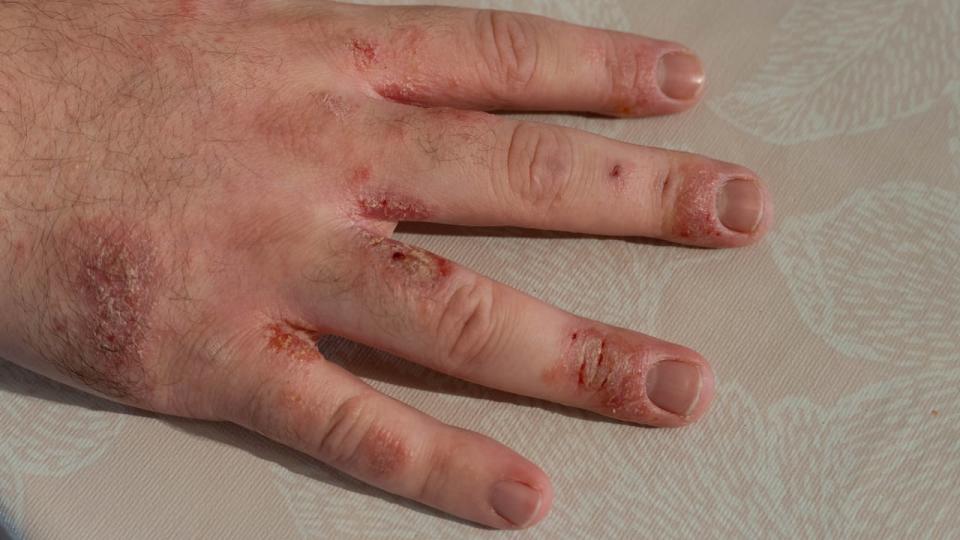
A drug called Dupixent gives Otahbachi some temporary relief from his symptoms, but the painful rash always returns after a few days, especially on his hands and arms. (Jean Delisle/CBC)
Most days, Otahbachi's skin is so sensitive that he strips down to his underwear at home because many fabrics irritate his condition.
Otahbachi, who was trained overseas as a pharmacy technician and worked in Canada as an Uber driver, has been unable to earn an income since falling ill. For more than three years, his young family — Otahbachi, his wife Fatima Outaleb and their two-year-old daughter — has relied on Outaleb's part-time salary to buy groceries.
Otahbachi's father, a civil engineer who also lives in Gatineau, has been covering the family's rent and paying most of their other bills, but recently told them he can't afford to continue much longer.
Desperate, Otahbachi and his family travelled to Morocco last spring at his in-laws' expense, where he was examined by several doctors and prescribed a variety of remedies. After nearly three months abroad the family returned to Gatineau.
"I was believing a lot that I could find something there," Otahbachi said. "Nothing worked at all."
Doctor agrees to back claim
When Otahbachi first described his medical ordeal to CBC in January 2023, he'd been unable to find a doctor in Quebec to back his compensation claim. (A separate compensation program exists for residents of the rest of Canada.)
An Ottawa allergist had signed a letter noting "a significant temporal relationship" between Otahbachi's vaccination and the onset of his symptoms, but it was not acceptable under Quebec's compensation system because the doctor doesn't practise in that province.
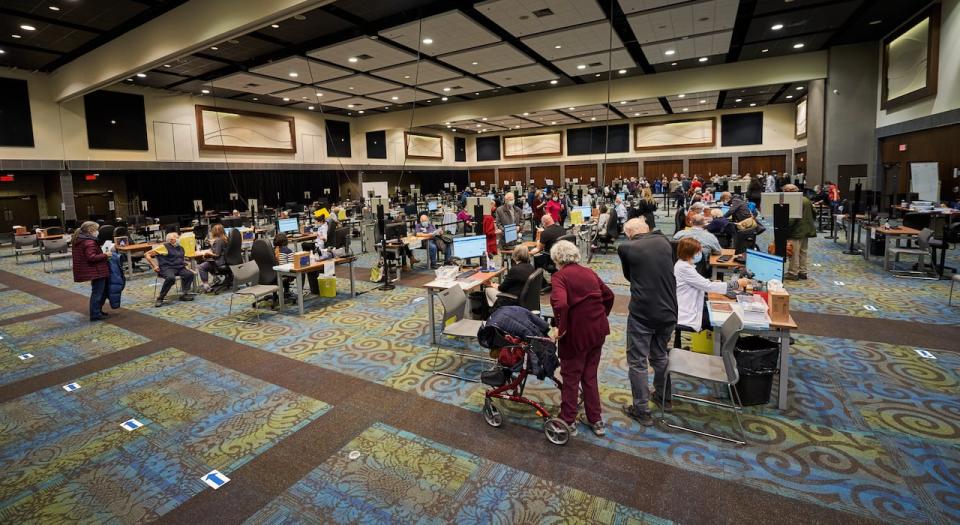
A COVID-19 vaccination clinic at the Palais des congrès in Gatineau, Que., opened March 11, 2021. (David Richard/Radio-Canada)
Otahbachi finally connected with Dr. René Lavigueur, a family physician based 900 kilometres away in Sainte-Anne-des-Monts in Quebec's Gaspé region. They met in Laval, where Lavigueur examined Otahbachi.
"It was not just normal eczema or psoriasis or something usual — it seemed like an autoimmune skin problem," said Lavigueur, who agreed to support Otahbachi's claim for compensation.
"If you have a shot and you have a little skin problem after, [and] you have a second shot and then it flares up, then it's quite likely that it's related to the shot," he said.
Lavigueur said he's represented about 20 patients seeking compensation through Quebec's vaccine injury program, none of whom have received a decision on their applications.
"I am probably the doctor in Quebec who is accepting willingly to represent them," said Lavigueur, who ruffled feathers within Quebec's medical community in 2021 when he penned an open letter warning parents to consider the risks before vaccinating their children against COVID-19.
Lavigueur has also been criticized for exaggerating the number of deaths caused by COVID vaccines, but he said he's not backing down.
"The knowledge is there, but you have to study it, you have to pass over all the propaganda … but very, very few doctors have done that," he told CBC. "Many of them know, but it's like a dead end. They don't want to ask the question, because what will they do with the answer?"
Permanent, serious injuries
Quebec's vaccine injury compensation program considers claims involving permanent, serious injuries where "a likely causal relationship between the vaccine and the injury exists."
Claims are reviewed by a three-member panel consisting of a physician appointed by the health minister, a second physician appointed by the claimant and a third physician chosen by the doctors who've been appointed.
Once the panel reaches consensus on a claim, they must then assess the severity of the injury using the same scale as Quebec's public auto insurance corporation. Benefits under the program can include coverage for income replacement, medical and "personal assistance" expenses, and the cost of rehabilitation.
According to the latest publicly available data, of the 441 claims submitted in Quebec since the compensation program was established in 1985, 201 have come in since 2021 when millions of Canadians were first vaccinated against COVID-19.
During that period, 22 claims have been assessed and only three have resulted in compensation. While COVID vaccine-related injuries undoubtedly explain the recent and dramatic rise in claims in Quebec, it's not known if they're among the few that resulted in compensation. (Quebec's compensation program covers injuries from vaccines for more than 30 diseases and infections.)
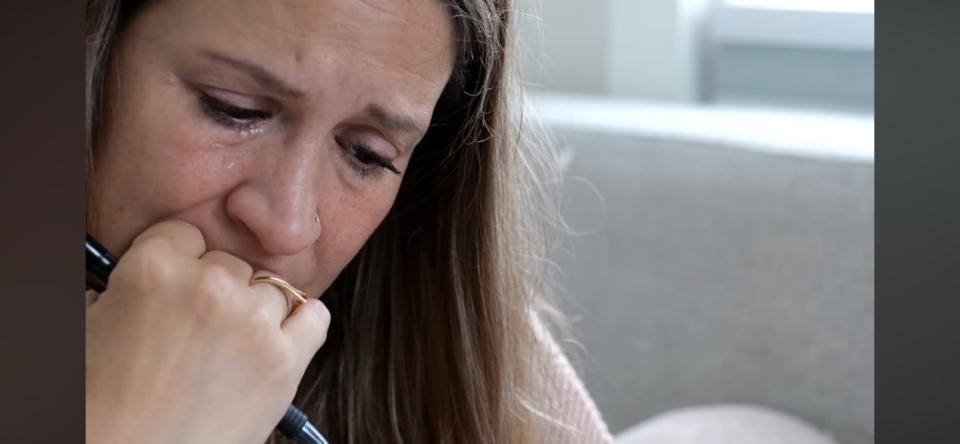
Kristin Ditzel, whose claim for compensation under Canada's vaccine injury support program was finally approved last year, speaks on the phone with a program representative from her home in Nelson, B.C. 'How many people even have that wherewithal with their injury to do that, and how many don’t have the strength to fight it?' she asked. (Jamie Killen/Heartwood Media)
Money starting to flow
Elsewhere in Canada, money has started flowing to victims.
Under the national compensation program, which began accepting claims in June 2021, the medical review board has approved 138 applications and paid out more than $11 million.
Kristin Ditzel, a single mother of three in Nelson, B.C., is among those successful applicants.
As a practitioner of traditional Chinese medicine who worked at a clinic, Ditzel was among the first Canadians to roll up her sleeve for a COVID vaccine in March 2021. But within minutes of getting the Pfizer-BioNTech shot her face grew numb, red spots appeared on her body and she lost the use of her limbs.
My entire life is just different. I lost everything. - Kristin Ditzel
Ditzel assumed she'd had a serious allergic reaction and would recover, but in the days and weeks that followed her health plummeted.
"I couldn't speak, I couldn't lift my head for at least three months. I felt like my spine was being torn from my body," Ditzel told CBC.
Like many patients who experience adverse effects after receiving a COVID-19 vaccine, Ditzel was told she had a "functional neurological disorder" and would likely recover within a few months.
Three years later, she continues to suffer convulsions, and basic tasks such as getting out of bed or making coffee can prove exhausting. Ditzel now describes herself as largely housebound.
"My entire life is just different. I lost everything," she said.
'I'm not going to give up'
She applied for compensation in June 2021 when the program was launched. A year later her application was denied, and her appeal took another year. This time the medical review board was convinced.
Ditzel received a lump sum under $90,000 — less than what she spent on stem cell therapy in Mexico, without which she believes she'd now be unable to walk or talk. She also recently began receiving a monthly allowance, but said it's not nearly enough to get her life back on track.
"It doesn't cover my expenses," Ditzel said, adding most people she's met through a growing online community of vaccine-injured Canadians have not undergone the demanding process of applying for compensation.
Nor have many found a doctor willing to back their claim, she added.
"How many people even have that wherewithal with their injury to do that, and how many don't have the strength to fight it?" she asked.
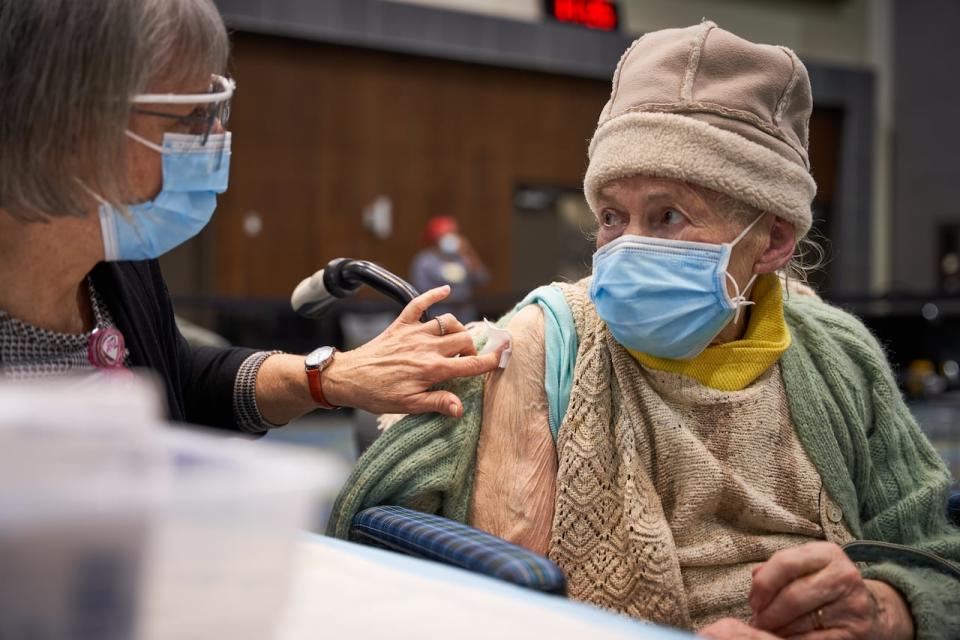
A woman receives a dose of a COVID-19 vaccine iat the Palais des congrès in Gatineau on March 11, 2021. (David Richard/Radio-Canada)
Both the Pfizer-BioNTech shot that Ditzel received and the Moderna shots that Otahbachi had are mNRA vaccines, which instruct the body's cells to build a protein that triggers an immune response.
In its letter to Otahbachi acknowledging receipt of his application, Quebec's Health Ministry advises that "given the current circumstances beyond our control, exceptional delays prevail in the files processing."
Lavigueur suspects there's another reason for the long wait for compensation.
"I think that they purposely delay because they see how scientific my descriptions are, and they see that they are in trouble because they told everybody that it was a very secure product. But in fact there are people, young people, who are handicapped or diseased for life because of this shot," he said.
"They see that they will have to put money on the table at the end."
Otahbachi said despite everything, he still believes Canada is a fair country that looks after its sick, and said he won't abandon his fight for compensation because it's his family's only hope.
"If they don't want to acknowledge that I'm a victim of … the vaccine, I'm not going to give up," he said. "I'm not going to give up at all."


